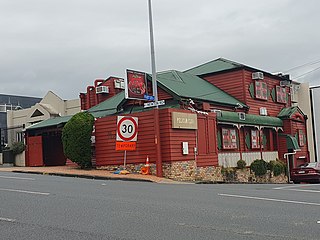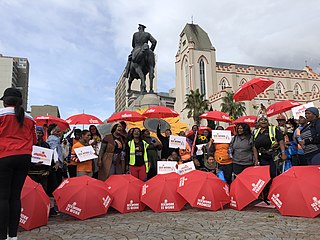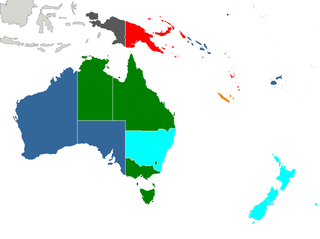
The Aotearoa New Zealand Sex Workers' Collective (NZPC), formerly the New Zealand Prostitutes' Collective, is a New Zealand-based organisation that supports sex workers' rights and educates sex workers about minimising the risks of the job.

Prostitution in New Zealand, brothel-keeping, living off the proceeds of someone else's prostitution, and street solicitation are legal in New Zealand and have been since the Prostitution Reform Act 2003 came into effect. Coercion of sex workers is illegal. The 2003 decriminalisation of brothels, escort agencies and soliciting, and the substitution of a minimal regulatory model, created worldwide interest; New Zealand prostitution laws are now some of the most liberal in the world.

Georgina Beyer was a New Zealand Labour Party politician who represented Wairarapa in the Parliament of New Zealand from 1999 to 2005, after serving as mayor of Carterton from 1995 to 1999. Beyer was the world's first openly transgender mayor, and the world's first openly transgender member of parliament. As a member of the Labour Party Beyer supported progressive policies including prostitution law reform, civil unions, anti-discrimination laws, and the promotion of Māori rights. She resigned in 2007, and, in 2014, unsuccessfully stood for election on behalf of the Mana Party.

Dame Kerry Leigh Prendergast is a New Zealand politician who served as the 33rd Mayor of Wellington between 2001 and 2010, succeeding Mark Blumsky. She was the second woman to hold the position, after Fran Wilde.

In Great Britain, the act of engaging in sex as part of an exchange of various sexual services for money is legal, but a number of related activities, including soliciting in a public place, kerb crawling, owning or managing a brothel, and pimping, are illegal. In Northern Ireland, which previously had similar laws, paying for sex became illegal from 1 June 2015.
The English Collective of Prostitutes (ECP) is a campaigning group which supports the decriminalisation of prostitution, sex workers' right to recognition and safety, and the provision of financial alternatives to prostitution so that no one is forced into prostitution by poverty. The group works against the social stigma that is associated with prostitution, and the poverty that is sometimes its cause. It provides information, help, and support to individual prostitute women and others who are concerned with sex workers' rights, civil, legal, and economic rights. The organisation was founded in 1975, and its first spokeswoman was Selma James.

Prostitution in Australia is governed by state and territory laws, which vary considerably, although none ban the selling of sex itself.
Prostitution in South Africa is illegal for both buying and selling sex, as well as related activities such as brothel keeping and pimping. However, it remains widespread. Law enforcement is poor.

The Prostitution Reform Act 2003 is an Act of Parliament that decriminalised prostitution in New Zealand. The Act also gave new rights to sex workers. It has attracted international attention, although its reception has been mixed. The Act repealed the Massage Parlours Act 1978 and the associated regulations.
Prostitution in Zimbabwe and related acts, including solicitation, procuring, and keeping a brothel, are illegal but thriving. Zimbabwe's dire economic situation has forced many women into sex work.

Dame Margaret Clara Bazley is a New Zealand public servant. She began her career as a psychiatric nurse and rose through the ranks to senior leadership positions at psychiatric hospitals and district health boards. In 1978 she became the Director of Nursing at the Department of Health, the chief nursing position in New Zealand and at that time the most senior position in the public service held by a woman, and in 1984 became the first female State Services Commissioner. She subsequently held top positions at the Department of Transport and the Department of Social Welfare.
Prostitution in Scotland has been similar to that in England under the State of Union, but since devolution, the new Scottish Parliament has pursued its own policies.

Dame Catherine Winifred Harcourt, known professionally as Kate Harcourt, is a New Zealand actress. Over her long career she has worked in comedy as well as drama in theatre, film, TV and radio.

The decriminalization of sex work is the removal of criminal penalties for sex work. Sex work, the consensual provision of sexual services for money or goods, is criminalized in most countries. Decriminalization is distinct from legalization.
Sex Industry Network is a peer-based, not for profit organisation, funded by SA Health, a South Australia government organisation. Its aim is to maintain low rates of sexually transmitted infections (STIs), blood borne viruses (BBVs) and HIV among sex workers and their clients in South Australia.

Prostitution in Oceania varies greatly across the region. In American Samoa, for instance, prostitution is illegal, whereas in New Zealand most aspects of the trade are decriminalised.

Dame Patricia Lee Reddy is a New Zealand lawyer and businesswoman who served as the 21st governor-general of New Zealand from 2016 to 2021.

Dame Therese Maria Walsh is a chief executive and business leader from New Zealand. Her particular successes include her roles as the chief operating officer for the 2011 Rugby World Cup and head of the organising body for the 2015 Cricket World Cup, held in Australia and New Zealand.

Roberta Perkins was an Australian sociologist, writer, and transgender rights and sex worker rights activist. She wrote several books and multiple academic articles on the semi-nomadic lives of transgender sex workers, and established the first assistance center for transgender people in Australia.

Dame Temuranga Batley-Jackson, known as June Jackson, was a New Zealand community worker and public servant.















